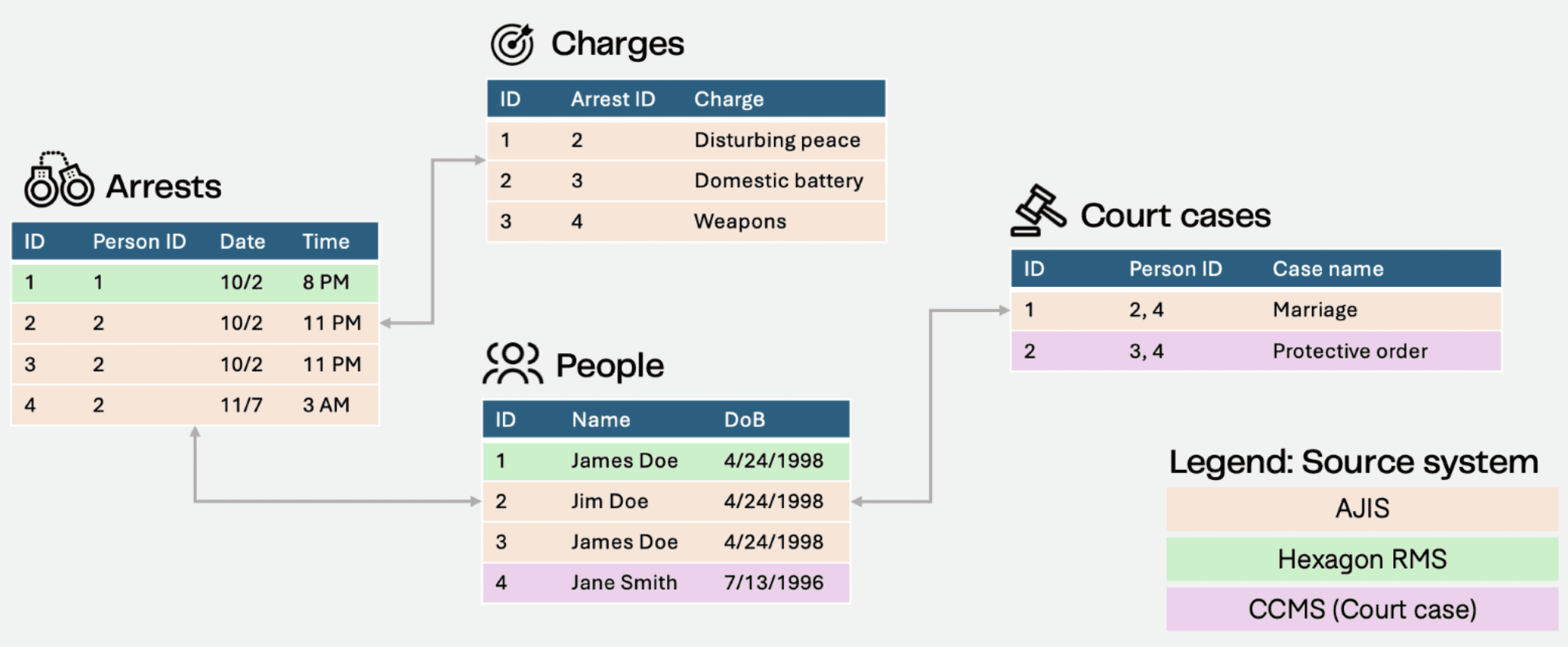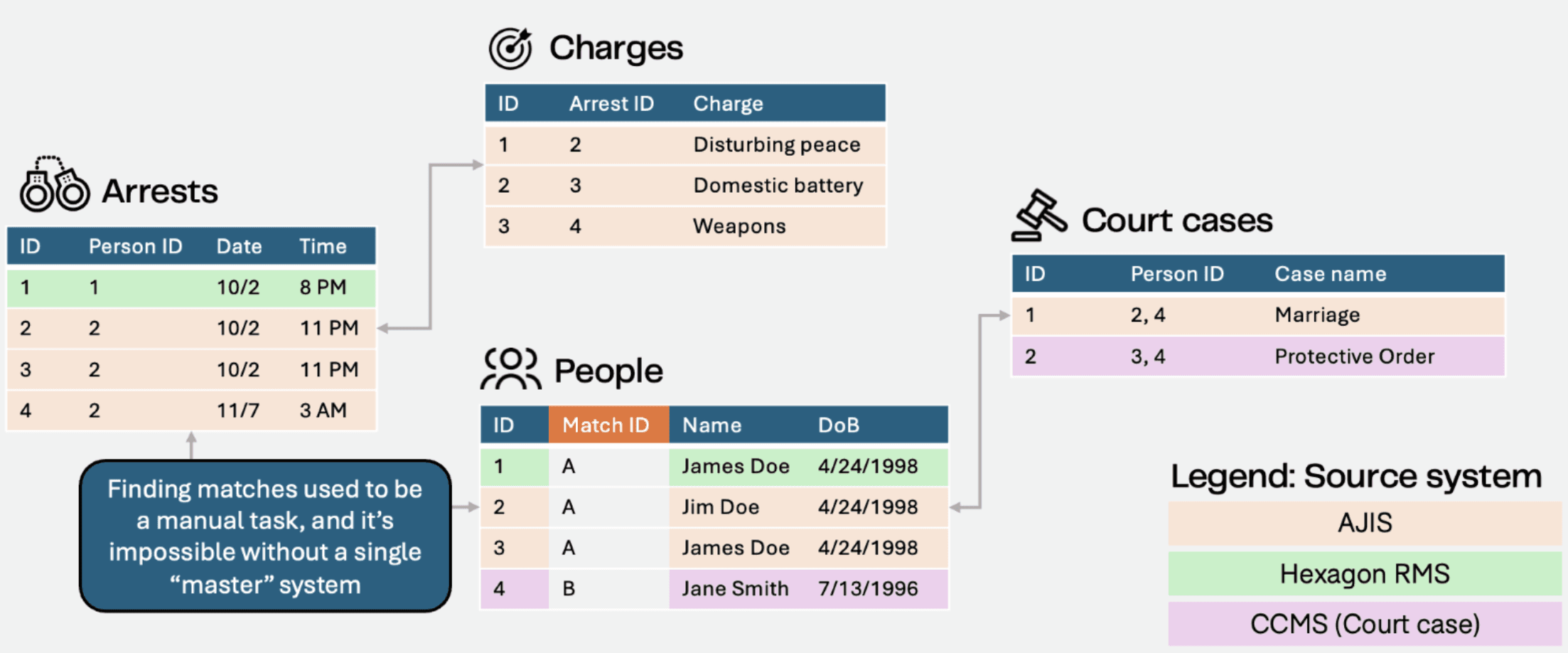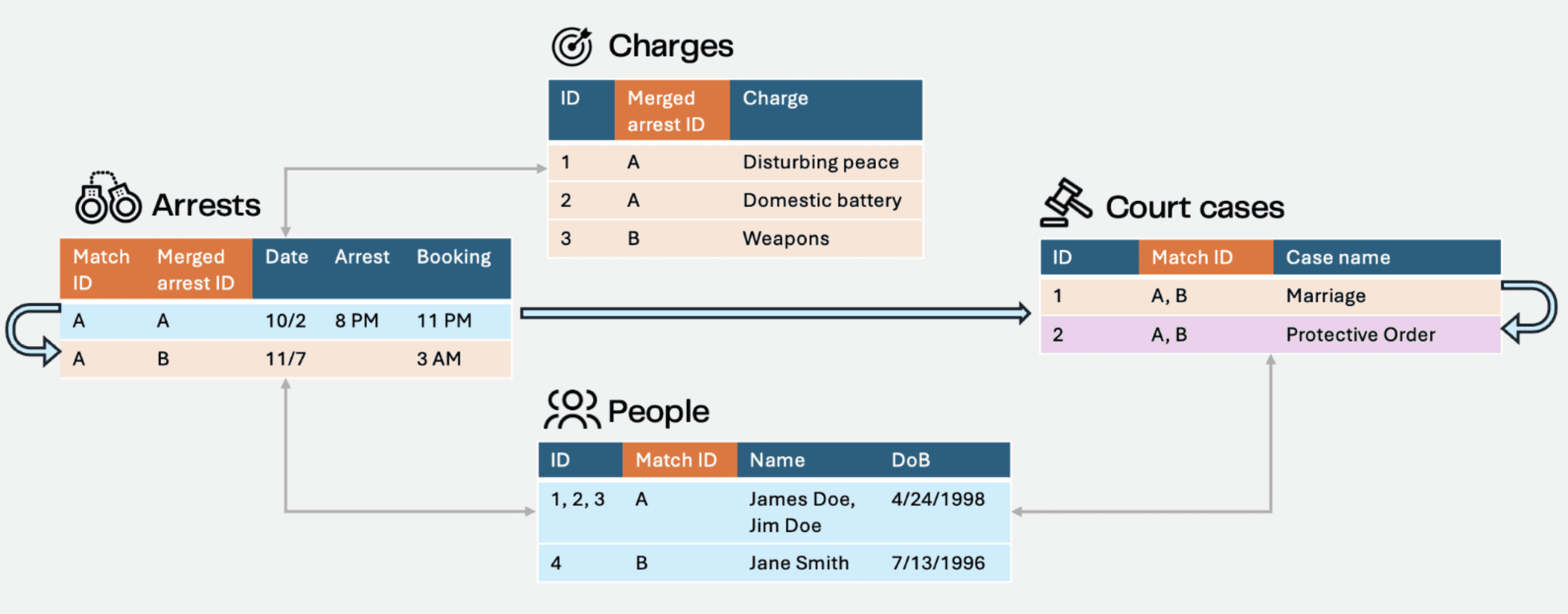City of Alexandria: Transforming data into intelligence for a stronger justice system
Meredith Berger
May 5, 2025
KEY IDEAS:
- Alexandria used Peregrine to integrate data stored across various departments and in the city’s legacy justice information system.
- Peregrine merges similar person records and draws connections among related incidents and individuals to provide a holistic view of each person’s journey through the justice system.
- Alexandria personnel save time and resources with streamlined data access, robust search capabilities, and automated entity resolution in Peregrine.
“We need to start by asking questions like, ‘What warrants are being issued? What crimes are being committed? Who is coming in and out of jail, and why? What resources do people need to prevent them from recidivating? How do we ensure courtroom processes are fair and unbiased?’ The answers to those questions are crucial to having a more effective and fair justice system."
Vanetta Pledger, Chief Information Officer
Alexandria, Virginia
ALEXANDRIA, Va. — For more than 25 years, Alexandria, Virginia, used a single legacy platform — the Alexandria Justice Information System (AJIS) — to manage all data stored across the city’s justice system. AJIS served as the central hub for the courts, the Commonwealth’s Attorney’s Office, the sheriff’s office, and the police department to share and collaborate on jail data, warrant data, and case data.
Eventually, the time came to replace the once-innovative, now-aging AJIS. When searching for alternatives, Alexandria found that the best software options were disparate point solutions, such as jail management systems (JMS), case management systems (CMS), and records management systems (RMS).
As city leadership moved to replace AJIS with these modern point solutions, they faced a new problem: data fragmentation. For city leaders to improve service delivery in Alexandria’s justice system, they needed a unified platform that would integrate fragmented information across the city’s various siloed systems while preserving the data’s integrity. Their solution: Peregrine, the integration platform that transforms public safety data into actionable intelligence.
Harmonizing information systems
Alexandria Chief Information Officer (CIO) Vanetta Pledger, who works across all city government functions, believes it’s important to deeply understand each department’s needs.
“I focus on ease of use and ease of access,” Pledger said. “I think about, what information do they need access to? How am I focusing on what technology we are delivering to make sure they can successfully use it to best do their job? I have in-depth conversations with law enforcement agencies and others to understand their problems and learn how they can best leverage technology to improve process and outcomes.”
When transitioning from AJIS to the new information system, Pledger and her team were tasked with reconciling disparate data models across departments. The fragmented data made it difficult to connect old and new cases that might be related. The systems were full of similar person records, and arrests and charges were counted differently depending on the system and department. Dirty data increased the risk of missing critical insights that might help protect their community.
To solve for this, Alexandria partnered with Peregrine to integrate data and deduplicate records from the legacy AJIS and the city’s new information systems. Peregrine securely cleaned, harmonized, and organized the data in a single, unified platform, all while preserving data integrity and complying with regulations.
Enhanced search, deeper insights
"Peregrine doesn’t just sell an incredible product but also provides the data scientist support that state and local agencies can’t afford.” —Vanetta Pledger, CIO, Alexandria
Logging into Peregrine today, an Alexandria employee can now conduct a simple search to find insights in data stored across the city’s disparate systems. Peregrine Search delivers ranked results to help users quickly find the information they need, whether they’re looking for a particular person, case, arrest, or another record or data point.
When a user clicks into a person’s record in Peregrine, they see a comprehensive summary detailing the person’s criminal history, their associates, their previous addresses, and other critical information. This streamlines complex data for city personnel to access and understand at a glance.
Peregrine’s mission is to make agencies’ data more accessible, meaningful, and actionable by deploying talented engineers, data scientists, and strategists to clean and enrich it. As Pledger stated, “Peregrine doesn’t just sell an incredible product but also provides the data scientist support that state and local agencies can’t afford.”
Person Match for deduplication
Peregrine tackled one of Alexandria’s toughest data challenges: redundant person records. Individuals often enter Alexandria’s justice system through multiple avenues due to data entry errors or variations in names, addresses, or dates of birth. This creates similar records across several systems, leading to confusion and inconsistencies. For example, a single arrest documented in the police department’s RMS might appear as multiple charges in AJIS.

To solve for this, Peregrine employed a proprietary entity resolution solution called Peregrine Match to automatically and securely merge similar records across different systems.
Using the above graphic as an example, let’s say James Doe entered the RMS as James Doe but entered AJIS as Jim Doe. Using machine learning, Peregrine's entity resolution methodology would merge these records into a single "match” and flag the match with an icon to indicate that it’s a merged record. Alexandria personnel could then click into each match to review detailed information about the merging process, including a list of the original data sources involved.
Match provides users with a comprehensive view of an individual's interactions with the justice system, saving city personnel time and effort over sifting through numerous records that often lack context.

To ensure data security and accuracy, Alexandria personnel can also manually merge records as long as they have the correct permissions in Peregrine. This enhances transparency and allows for a human-in-the-loop approach, ensuring accountability throughout the process.
“This is game-changing,” Pledger said of Match.
Merging records for a cohesive narrative
With data modeling and entity resolution in place, Alexandria has improved its ability to uncover trends that could impact public safety outcomes. For example, Alexandria can more easily tie together various cases, arrests, and documents such as marriage licenses and protective orders. In the past, these records may have lived in different systems and been difficult to connect, but Peregrine brings them together to tell a story and add color to a person’s journey through the justice system.
The image below illustrates the story of James (or Jim) Doe and Jane Smith, a married couple. Jim entered the system through a few different avenues and under different variations of his name. Peregrine merges those similar records, making Jim’s arrest and charge data clearer and easier to understand.

Peregrine draws connections among various incidents involving Jim, each sourced from a different information system:
- Jim’s arrest for domestic battery on Oct. 2 (source: RMS)
- Jane’s protective order following Jim’s domestic battery arrest (source: CCMS)
- Jim's arrest for a weapons charge on Nov. 7 (source: AJIS)
By connecting the above incidents, Peregrine reveals a pattern of domestic violence between Jim and Jane. This integrated view provides a more complete understanding of the situation and helps inform critical follow-up actions, such as checking on Jane’s safety after Jim’s latest arrest.
‘A continuous and robust understanding’ of community justice
For each data point on its platform, Peregrine goes beyond the what to illuminate the why, providing valuable context for public safety incidents. Pledger emphasized the importance of drawing those connections to gain a deeper understanding.
“We need to start by asking questions like, ‘What warrants are being issued? What crimes are being committed? Who is coming in and out of jail, and why? What resources do people need to prevent them from recidivating? How do we ensure courtroom processes are fair and unbiased?’ The answers to those questions are crucial to having a more effective and fair justice system,” Pledger said.
Pledger said she believes in the power of creating a true common operating picture across justice and public safety.
“The goal must be nothing less than a continuous and robust understanding of what is happening, when, and where, from the beginning of the judicial process to the end,” she said.
Peregrine streamlines workflows for Alexandria’s city personnel by reducing the need for multiple logins and user interfaces. This empowers users to uncover insights faster and understand city data more holistically, ultimately benefiting not only city staff but all Alexandria residents.
Integrated justice: What’s next?
Looking ahead, Alexandria is starting to use dashboards in Peregrine to track recidivism and offer insights into reoffending patterns by pulling in information from its JMS, RMS, and CMS. As Alexandria continues implementing Peregrine and more city personnel adopt the platform, new use cases will emerge across departments, unlocking unprecedented possibilities for enhancing resident safety.
Contact our team to learn how Peregrine’s data integration solution can support your community in creating a more connected, informed, and effective government.
Peregrine is built on AWS GovCloud.
